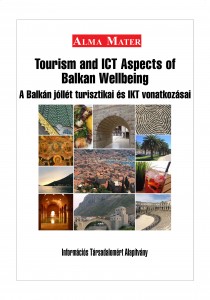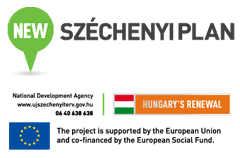
Title:
Tourism and ICT Aspects of Balkan Wellbeing – a Balkán jóllét turisztikai és IKT vonatkozásai
Author:
INFOTA
Date:
2015. October
Pages: 322
ISBN: 978-615-80061-2-5
ISSN: 1587-2386Since 2001, the Alma Mater series has been a primary Hungarian scientific publication forum for information and knowledge management, besides – because of the interrelation of scientific areas and by the opportunity of cross competences present in the workshops – having also rightly gained attention in international professional communities as a book series of scientific studies.
The present volume – in the course of our thematic publications – is a summary of the most recent regional well-being researches carried out in the widely interpreted Balkan area from the aspects of tourism and the info-communicational technologies.
-
- Title:
- Balkan Wellbeing and Health Tourism: An Overview
- Author(s):
- Melanie Kay Smith
- Pages:
- 7-62
- Language:
- English
- This paper analyses data that was collected as part of a project which focused on eleven Balkan countries. The main aim was to research the wellbeing levels of residents in these countries and the main factors that contribute to their wellbeing. A second aim was to identify which activities they enjoy most in order to develop future domestic and regional leisure and tourism products. Several research methods were used including secondary data collection of academic sources and Quality of Life, Life Satisfaction, Happiness and Wellbeing Reports, and primary data in the form of a questionnaire from 11,000 respondents from the eleven Balkan countries. A Delphi Study was also undertaken with expert practitioners and researchers from seventeen countries. Looking at the results overall, in terms of future leisure and tourism developments, it seems that the activities which would most enhance the wellbeing of Balkan people are connected to traditional food, religion, landscape (especially seaside) and natural healing resources.
-
- Title:
- Wellbeing dimensions of the tourism representation of the Balkans
- Author(s):
- Gábor Michalkó, Kornélia Kiss, Dorottya Teveli-Horváth, László Puczkó, András Jancsik, Ivett Sziva, Judit Sulyok, Melanie Smith,
- Pages:
- 63-82
- Language:
- English
- The Balkans used to be a citadel of tourism in Europe. Regime changes, the Yugoslav wars, global recession and their political, as well as economic and social consequences reshaped the region’s tourism oriented offer significantly and in connection with it, the volume and composition of demand. In spite of the changes that took place during the past quarter of a century, tourism continues to be a driving sector of the region and its success has an impact on the local population’s quality of life. Indicators of tourism turnover can be influenced significantly by the “mental” image of the Balkans. Thanks to internet-based social media and state-of-the-art mobile communication means any associations with the region can be confirmed or changed, in particular the recent tourism experiences which shape the notions associated with the region are now accessible to everyone. As the essential elements of the Balkans’ image can be viewed quite well in the comments uploaded to the Tripadvisor travel portal, this study proposes to understand the tourism related aspects of this concept by analyzing this database. The study is an attempt at exploring the Balkans-specific connections in the triad of image-tourism-quality of life.
-
- Title:
- A Balkán (egészség) turizmusa
- Author(s):
- Kiss Kornélia
- Pages:
- 83-120
- Language:
- Hungarian
- Competitive and sustainable tourism can be a good tool for economic development and natural and cultural heritage conservation especially in the Balkans, a region with a small population, low purchasing power and unfavourable export revenue generating opportunities. Most of the countries in the region consider tourism as an important, mainly economic activity, and this will increase in the future. Health tourism which is a common element in the Balkan countries’ tourism supply, can be described as having significant potential even on an international scale. The aim of the current study is to provide an overview of tourism and health tourism demand and supply of the Balkans, and to identify the strengths and weaknesses and the development opportunities of the region’s health tourism.
-
- Title:
- A Balkán turizmusának feltételrendszere
- Author(s):
- Kiss Kornélia
- Pages:
- 121-136
- Language:
- Hungarian
- The socio-cultural, political and economic environment form the framework for tourism development. This statement is especially relevant for the Balkans which is one of the most distinctive geopolitical constructions of Europe and the world. The aim of the current study is to provide an overview of the socio-cultural and economic environment in the Balkans. The results of the study can be used in the wellbeing and health tourism development of the region.
-
- Title:
- Az erdei fürdőtől a török hammamig – A Balkáni országok márkapolitikája az egészségturizmus terén
- Author(s):
- Apró Éva, Balázs Olívia, Kiss Kornélia Michalkó Gábor, Puczkó László Melanie Smith, Sziva Ivett
- Pages:
- 137-154
- Language:
- Hungarian
- The Turkish hammam is a commonly known type of baths, actually without pools. In Serbia one can bath in the so called „forest hammam”, and can recharge the batteries from the energy of the nature. While in Croatia, in an Istrian destination the visitors can bath in crystal clear lakes and waterfalls by following the footprints of a Goodness. The latest bathing types are presumably not as well-known as the first one, though in the countries of Balkan there are plenty of examples like these experiences, based on unique natural and cultural resources, which can be further developed as attractions in health tourism. The question is whether these countries have already realized their uniqueness in this area, and whether they can consciously use their resources to improve their positions in the health tourism market? The main objective of the article is to highlight the importance of branding and positioning in the tourism market, and to analyze using structured content analysis the issue: how consciously build the countries of Balkan their brands in health tourism through their online communication.
-
- Title:
- Modern ICT technologies – situation and trends
- Author(s):
- Ferenc Kiss, Attila Horváth, Marianna Török, István Szanyi
- Pages:
- 155-186
- Language:
- English
- In the framework of the research work carried out in the Balkan region, the technological map of modern ICT application potentials of the regional wellbeing and wellness conceptions as well as that of the development opportunities by the support of ICT has been established. It covers all basic IT solutions that fundamentally identify all current directions of IT technology development and are the basis for the elaboration of touristic IT resolutions that are appropriate for meeting all the requirements of 21st century guests. In the course of the technological map establishment, on the one hand, basic info-communicational technologies are included in the map that mainly identifies the IT development trends. Then an investigation has been implemented presenting the info-communicational status and trends of the project’s target countries. Based on the experiences, a definite technological solution was made in the framework of the Touristic Program Navigator application that is also outlined as part of the article.
-
- Title:
- Service Technology Profiles suggestions for the Balkan tourism industry
- Author(s):
- Attila Horváth, Ferenc Kiss
- Pages:
- 187-214
- Language:
- English
- The article introduces the service technology profile (STP) concept, and how this can be utilized to help systematic technological innovation within tourism industry. Based on Budapest Metropolitan University’s and INFOTA Research Institute’s joint efforts in Balkan Wellbeing research the examinations tried to identify a certain mix of base technologies, online communication and marketing channels and ICT-based value added services in order to present and connect the attractions and tourism services mentioned above with the potential visitors as effectively as possible. This ideal mix has been defined for nine main groups of attractions and tourism services. The article first identifies the STP concept and assembles a complete inventory of technological components in use of tourism best practices. Then it assembles and unfolds the nine service technology profiles for the main attraction and service groups mentioned above.
-
- Title:
- Az információmenedzsment szerepe a vonzerők prezentációjában és a kulturális örökség megőrzésében
- Author(s):
- Kiss Ferenc, Horváth Attila, Bassa Lia, Benkő Zsanett, Szanyi István
- Pages:
- 215-248
- Language:
- Hungarian
- Current article is investigating in the application potential of information management tools in tourism, with special regard to cultural heritage preservation and transfer. The article examines a group of the modern infocommunication technology that optimally meets the 21st century expectations for representing attractions as well as for the transfer of heritage information. It is often a fundamental problem in the case of heritage sites, collections, properties that the traditional representation partly limits the transfer of the whole of the related information and partly it is not interesting or not visual enough for the present generations as it does not exploit sufficiently the technological communicational opportunities provided by our days that is a basic requirement on behalf of the youth of today. The article examines the role of information management notion categories and their toolkit in tourism, then following the outlines of some touristic market trends, it enumerates all info-communicational techniques that are available for the managers of sites, attractions, services when setting up their own digital representation and service mix.
-
- Title:
- A Balkáni régió turisztikai IKT helyzete és várható fejlődése
- Author(s):
- Kormos Gergely, Kiss Ferenc, Horváth Attila
- Pages:
- 249-286
- Language:
- Hungarian
- The article below is primarily aiming at the info-communicational technological and touristic mapping of the Balkan region as well as the investigation and description of the potential development tools and directions. The research relies partly on a query assessment that can rather be considered as a series of qualitative deep interviews rather than a classical quantitative questionnaire resulting from the structure of the query and the professional background of the respondents. The 11 examined target countries have a sporadic ICT development level, whereas there is no development plan or concept found either that is valid for the whole region. The role of the ICT solutions applied within the Balkan region is not significant, so targeted and conscious development is to be carrie3d out in this area in the future. The Internet penetration in the Balkan region as a whole is below the European average but regarding broadband mobile internet coverage, the area has got acceptable results. The ICT development level of the region equals that of the United States of America in the early years of 2000. In spite of that – based on the analyses carried out – in the following 15 years, the region will be able to make up for its backlog in the area of info-communicational technology and online tourism by a steady increase pace.
-
- Title:
- Infokommunikációs technológiák a turisztikai szektorban a Balkán régióban
- Author(s):
- Kiss Ferenc, Horváth Attila, Török Marianna
- Pages:
- 287-304
- Language:
- Hungarian
- The article deals with the achievements of mapping the ICT solutions to be applied in tourism as well as their info-communicational development level. Besides, the presentation of the main trends has also been aimed at which characterises the joint progress of the technologies and tourism industry in the region. The other target of the project has been the introduction of service technological profiles that can provide a solution for the ICT based improvement of an outstanding area of the tourism branch. The current article presents first the online tools, basic technologies, solutions that are most frequently applied in the tourism industry. The social media, the search engines, the smart mobile tools all have an outstanding role in the formation of the tourism in a new era. They serve the travellers as search, decision support, client service and communication channels. The tourists of today do not only count on the presence of modern info-communicational tools in the course of search and preparation but also on the spot. The article also presents them and evaluates their role in the given sectors of tourism.


